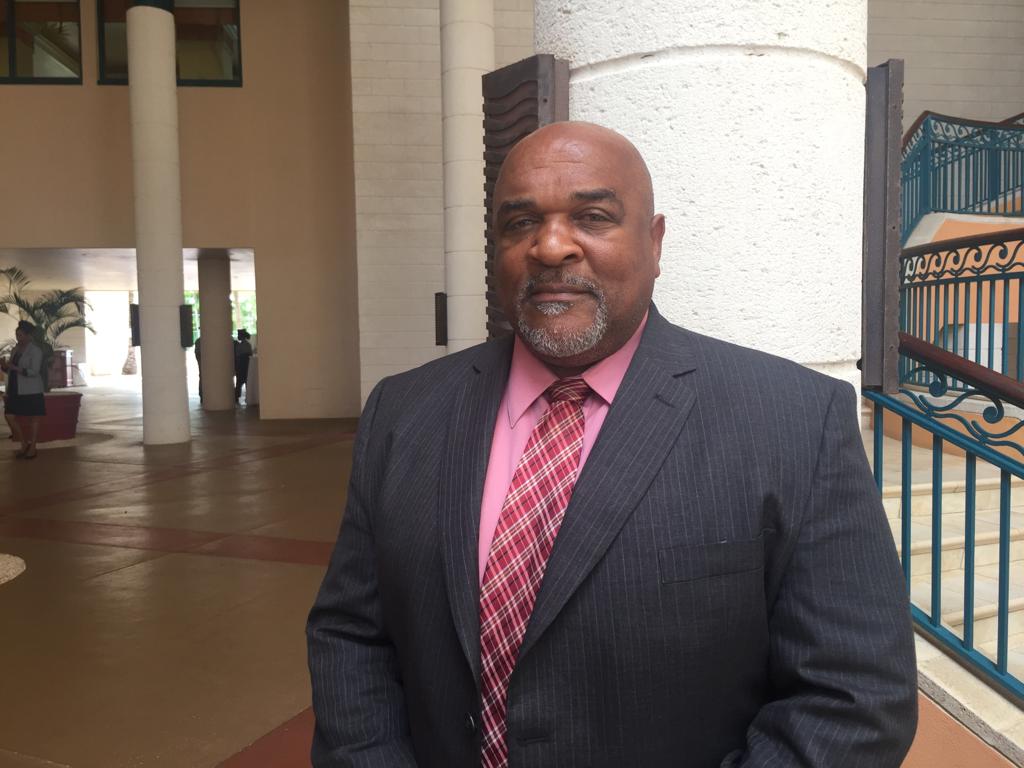IICA introduces Caribbean countries to a project aimed at creating a Global Center for Resilient Agriculture in Dominica

with authorities of IICA and OECS the project to build a Global Center for Resilient Agriculture
in this caribbean country.
Bridgetown, Barbados, 11 October 2018 (IICA). The Inter-American Institute for Cooperation on Agriculture (IICA) and the Organization of Eastern Caribbean States (OECS) introduced the Ministers of Agriculture of the Caribbean, as well as representatives of international organizations and donor agencies, to a project aimed at establishing a Global Center for Resilient Agriculture in Dominica, which will disseminate, at the global level, experiences and technologies related to climate-smart agriculture.
The presentation, which was carried out within the framework of the Caribbean Week of Agriculture in Barbados, was led by the Deputy Prime Minister and Minister of Agriculture, Food and Fisheries of Dominica, the Honourable Reginald Austrie; the Director General of the OECS, Didacus Jules; the Special Advisor to IICA in the Caribbean, Patrick Antoine; and the Director General of the hemispheric agency, Manuel Otero.
The OECS is an inter-governmental organization dedicated to economic harmonization and integration, protection of human and legal rights, and the encouragement of good governance among its ten member countries: Antigua and Barbuda, Dominica, Grenada, Montserrat, St. Kitts and Nevis, Saint Lucia, Saint Vincent and the Grenadines, British Virgin Islands, Anguilla and Martinique.
After overcoming one of the most critical stages of the reconstruction process following the devastation caused by hurricanes in 2017, Dominica anticipates that the project will create a powerful knowledge-sharing forum of great relevance to Eastern Caribbean countries.
“I wish to thank to the Director General of IICA and his staff for their swift response to the proposal we submitted a few months ago, when we requested the Institute’s support in order to present, during the Caribbean Week of Agriculture, the proposal for a Global Center for Resilient Agriculture in Dominica. We also appreciate the assistance received in organizing this forum, which included the participation of ministers of agriculture; strategic partners such as CARDI (Caribbean Agricultural Research and Development Institute), IICA and CDEMA (Caribbean Disaster Emergency Management Agency); and representatives of regional organizations,” stated Minister Austrie.
“A large number of partners have pledged their support for this initiative, which will benefit agriculture and food security not only in Dominica, but also throughout the entire region, where we experience the same problems in terms of hurricanes and other natural disasters,” he added.
According to Antoine, the center is expected to develop research and innovation programs, and to become part of knowledge- and experience-sharing networks with universities and specialized institutes.
The framework of the proposal will be presented in March, and the Center is expected to be officially inaugurated within 12 to 18 months.
“We hope to identify synergies within the framework of this proposal, which will be presented to the high echelons of the government. We would have a project that is ready for implementation in about 6 or 7 months. If we succeed in putting together this project proposal, it will be of great relevance both in Dominica and in the region; not only would it enable us to diminish the impact of natural disasters such as hurricanes, but it would also put us on the path to a more rapid, swift recovery,” explained Minister Austrie.
“We will present the Resilience Center to the rest of the world, and we will invite as many countries as possible who believe that they could benefit from the center, to participate in this initiative,” he concluded.
Dominica, on the road to recovery
Minister Austrie noted that the country was back on its feet again, following the devastating effects of hurricane Maria. He confirmed that the rural sector is exhibiting a new dynamism following the havoc wreaked by recent extreme natural phenomena, which affected the country’s infrastructure, economy, and by extension, its agricultural activity.
“Basically, we are back on track. In fact, when we look at the figures, we can see that farmers of certain products have demonstrated true resilience by going back to the farms immediately after the hurricane, so we can now feed ourselves properly. Our food security issues in the short-term are currently being addressed. In fact, we are now producing for international markets and are exporting banana and other fresh fruits and vegetables; we are now back into the regional market,” he explained.
Dominica is being used, at least informally, as a case study for analyzing ways in which countries can recover from a major disaster as well as avoid food shortages and the stagnation of production systems under these circumstances.
“We have learned lessons which we believe will prove very valuable as we continue to produce, export and expand our industry. Hurricane Maria has exposed some weaknesses regarding our farming areas and methods, which must be reviewed. In fact, Maria has given us an opportunity to restructure our farming practices, both at the Ministry and farm levels. We have learned a great deal and that is why we believe that this Center is going to play a major role,” added Minister Austrie.
The Government of Dominica recently recognized IICA’s contribution to the organization of farmers, as well as its support for the coconut chain and honey producers following the damage caused by hurricanes Irma and Maria almost one year ago.
The Caribbean country also received funding from the World Bank in order to drive improvements in the areas of fisheries, agriculture and infrastructure.
Más información:
Ena Harvey, Representante del IICA en Barbados